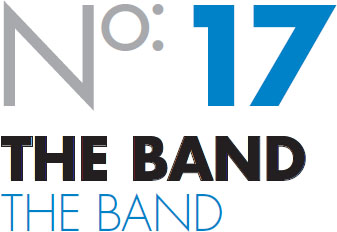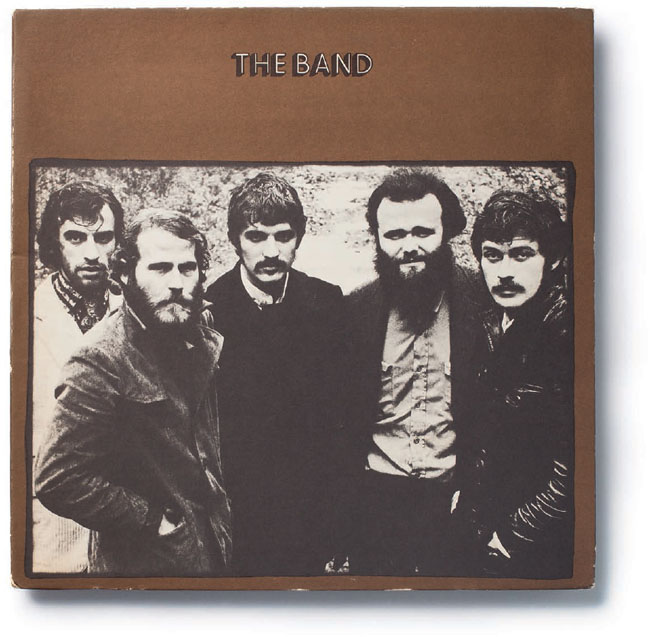
Capitol
Produced by John Simon
Released: September 1969
TRACKLISTING
01 Across the Great Divide
02 Rag Mama Rag
03 The Night They Drove O ld Dixie Down
04 When You Awake
05 Up on Cripple Creek
06 Whispering Pines
07 Jemima Surrender
08 Rockin’ Chair
09 Look Out Cleveland
10 Jawbone
11 The Unfaithful Servant
12 King Harvest (Has Surely Come)
In 1968 Music from Big Pink broke on the music world like a tsunami. After hearing it Eric Clapton broke up Cream and George Harrison almost left the Beatles. The group that made the album had no name – they were simply known as ‘the Band’. The name stuck. The simplicity of the name and its distance from show business razzamatazz seemed to fit. These five musicians had spent eight years playing one night stands in bars behind ’50s rocker Ronnie Hawkins before they were recommended to back Bob Dylan for his legendary 1966 world tour. In 1967 they retreated to a house in upstate New York where, with Dylan’s assistance, they worked up their own sound. All five players – Jaime Robbie Robertson, Rick Danko, Richard Manuel, Garth Hudson and Levon Helm – were multi-instrumentalists, steeped in R&B, blues, early rock and country music. They swapped instruments, sang in harmony and unison. Big Pink was a unique and powerful statement in 1968 and the following year the album called simply The Band upped the ante.
Rather than face another New York winter, the Band decamped to Los Angeles where they turned Sammy Davis Jr’s pool house into their own clubhouse-cum-recording studio. All the instruments were set up in one room facing each other and the steam room became the echo chamber. Photos suggest the studio looked like a moonshiner’s hideout.

During his tenure with Dylan, Robbie Robertson started to write character-based songs. Fascinated by Levon Helm’s stories of rural Arkansas and the myths of the American South, Canadian-born Robertson began writing songs that recreated this dream world. ‘The Night They Drove Old Dixie Down’ is Robertson’s telling of the Civil War story, attempting to convey why and how the notion that the South will rise again has survived for more than 100 years.
The Band is an expression of Americana and the South that ranks with the works of Faulkner or Steinbeck’s best novels. Critic Griel Marcus said of the album, ‘It felt like a passport back to America for people who had become so estranged from their own country that they felt like foreigners even when they were in it’.
The Band was a completely unique ensemble in every respect. Helm, Danko and Manuel shared lead vocals. Helm had a hard-bitten dirt farmer rasp while Manuel had an exquisite high register that sounded like an angel with a broken heart. The fact that both were also drummers created the unique syncopation and, with Rick Danko’s bass, this trio made up the funkiest white band in history. ‘Up on Cripple Creek’, featuring Garth Hudson on a clavinet that sounds uncannily like a Jew’s harp, is as funky as any Stevie Wonder track. Danko’s fiddle on ‘Rag Mama Rag’ sounds like a bluegrass with a whole different shade.
For Robertson the key to the album was the last song, ‘King Harvest (Has Surely Come)’. ‘That’s when life begins, not in spring but in the autumn,’ he said. ‘In the fall that’s when the harvest is in and the carnival is in town.’ The steady loping rhythms of the song have the sense of the weather roiling across the Great Plains and the hope and fear in the voice of the farmer who has bet the farm on the promise of rain.
The Band took the familiar – carnival music, R&B and country – and created something completely unfamiliar and unique. ‘Everything in rock was kind of going in that high end direction,’ said Robbie Robertson. ‘We wanted a kind of woody, thuddy sound – something different.’